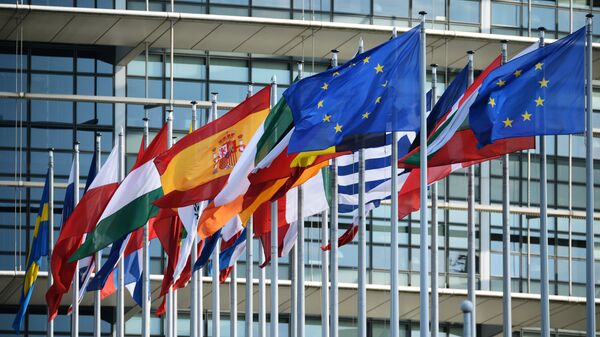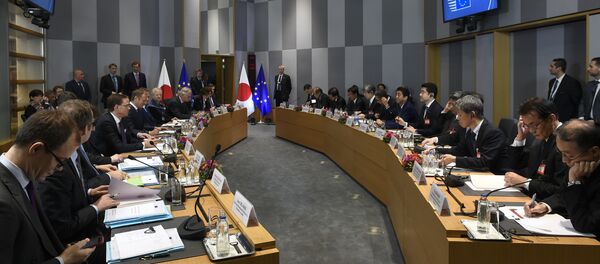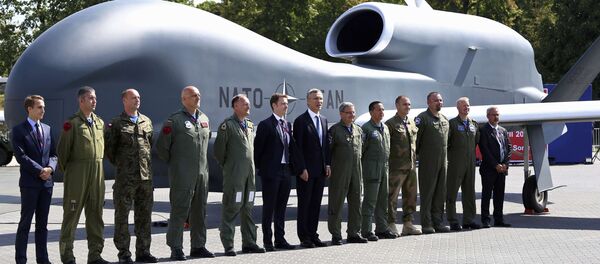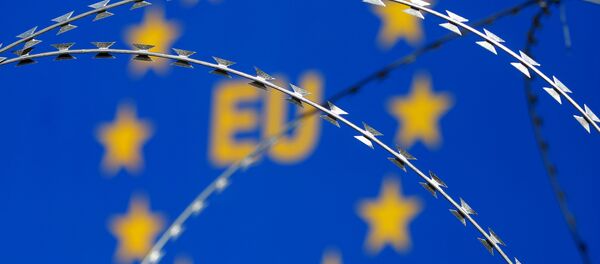Sputnik discussed the prospect and effectiveness of such an alliance with Roberto Castaldi, the director of the Research Centre on Multi-Level Integration and Governance Processes at the eCampus University, who also serves as the research director of the International Centre for European and Global Governance
Sputnik: In your opinion, how much responsibility does Brussels bear for the rise of the Eurosceptic movement?
Roberto Castaldi: A lot, in the sense that the rise of nationalism around Europe is linked to the fact that the European Union has been unable to deliver on the citizen's demands, but this was more the responsibility of the national governments than of the Brussels institution.
So on the one hand it's the EU which is blamed for not delivering, at the same time it's the member states which decided not to provide EU with the powers and the competence to deliver. We should never forget that the overall budget of the EU is just 0.9 per cent of the European GDP.
Sputnik: Looking ahead at the upcoming European elections, would you say that the Eurosceptic alliance stands a high chance of succeeding there?
Roberto Castaldi: I think there would be an increase of the nationalist forces in the European Parliament but I don't think this will change the political balance significantly. On the one hand, the polls around Europe suggest that while they will increase their seats in certain countries they will not have the same […] and overall we can expect to still have a wide majority of pro-European parties, [I',] thinking about the EPP, this Socialist, the Liberal, the Greens and so on.
READ MORE: 'I Don't Care About Europe': Trump Says He's Cool With Losing Support in EU
Furthermore, in the new election for the first time we'll have new political forces with a clear European stand, like Volt or DiEM25, so there is going to be more fragmentation in the European Parliament, but at the same time, there should still be a wide pro-European majority.
Sputnik: How much pressure, in fact, are Italy and Poland, going further, Greece and Hungary likely to feel from Brussels?
Roberto Castaldi: I think a lot. There is a crucial issue that will probably come up also in the electoral campaign which is the rule of law. In certain countries like Hungary and Poland, not yet Italy, but the support by Salvini of the Polish reform of the judiciary suggests that Italy may have the same risk, but some of the reform in Hungary and Poland clearly put at risk the rule of law and the fundamental principle of the European legal order.
So this is a crucial issue because the rule of law is still something which is very fundamental for many Europeans, and if the pro-European forces will be able to put this at the centre of the electoral campaign, this can be a very big obstacle for the nationalists.
But one of the interesting things about all this debate is that, for the first time, the European election will be fought on European issues. In the past, in each country, the debate was always on national issues and Europe was just one of the topics but [a] relatively marginal one. For the first time the European election will be truly European, with a European debate on the future of Europe, so the result of the election will be much more significant regarding the future destination, the direction of the reform, the European Union should undertake.
READ MORE: Italy's Not Prepared to Change Budget Before EP Elections in May — Consultant
Especially for this reason our centre together with partners from many other countries has just developed an interesting tool, a virtual learning environment with free online courses, very short, entertaining and simple on the EU to help citizens understand how the European Union works, what are its power and competences, its history and challenges. It is available in five languages at the website www.awareu.eu and it's just a contribution to help citizens understand what is at stake when we speak about the European Union and, therefore, what is at stake at the next European elections.
Sputnik: Certainly sounds like a very useful tool that you just now mentioned. But generally if we look at the Eurosceptic movement, what is your personal opinion regarding its future?
Roberto Castaldi: They may have some success in these elections, they might increase their number of seats in the parliament, but I don't think they will manage to have a deep impact on the decision-making process, basically for two reasons.
For instance, Salvini would like the other countries to help Italy more on migration but the other nationalists are completely against this. Salvini and Di Maio tried to have a budget in Italy that was completely out of European rules and its nationalist allies voted against him in the Eurogroup, asking the Commission to force Italy to comply with European rules.
So they don't really have any positive agenda, any proposal on which they can work together, they're just making an alliance for the sake of power, to be able to create a stronger group, to get more relevant positions, but they don't really have an agenda.
The views and opinions expressed in this article are solely those of the speaker and do not necessarily reflect Sputnik's position.






